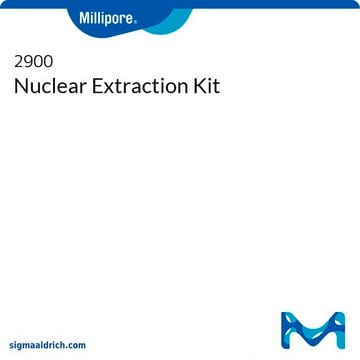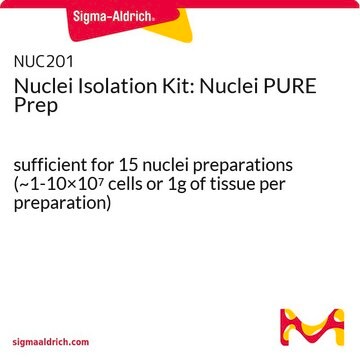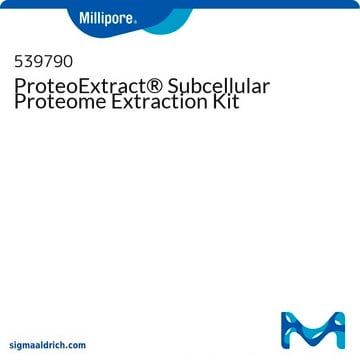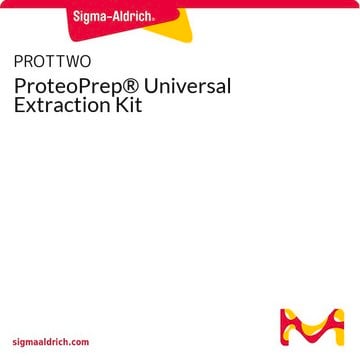CELLYTPN1
CelLytic™ PN Isolation/Extraction Kit
For plant leaves
Sinónimos:
Cell lysis kit
Iniciar sesiónpara Ver la Fijación de precios por contrato y de la organización
About This Item
UNSPSC Code:
41116134
NACRES:
NA.56
Productos recomendados
Quality Level
usage
kit sufficient for 30 extractions (20 g of fresh or frozen leaves)
technique(s)
ChIP: suitable
shipped in
wet ice
storage temp.
2-8°C
Categorías relacionadas
General description
CelLytic™-PN extraction kit is for the isolation of nuclei and extraction of functional nuclear proteins from plant leaves. Nuclei or nuclear proteins can be extracted from few grams to hundreds grams of fresh and frozen leaves. The nuclear protein extract is suitable for the detection of DNA-protein interactions using gel-shift assay, DNase-I footprinting analysis as well as western blot assay and similar techniques. The isolated nuclei can also be used as a source for chromatin, genomic DNA and histones.
Application
The nuclear protein extract is suitable for the detection of DNA-protein interactions using gel-shift assay, DNase-I footprinting analysis as well as Western blot assay and similar techniques. The isolated nuclei can also be used as a source for chromatin, genomic DNA, RNA, etc. The kit provides a detailed protocol for nuclei isolation and protein extraction from four plant models: tobacco, tomato, spinach, and Arabidopsis.
Features and Benefits
Efficient Nuclei Isolation and Protein Extraction: CelLytic™ PN Isolation/Extraction Kit provides a fast and efficient method for isolating nuclei and extracting functional nuclear proteins from plant leaves, saving time and effort for academic researchers.
Versatility: The isolated nuclei can be used as a source for chromatin, genomic DNA, RNA, etc., making CelLytic™ PN Isolation/Extraction Kit a versatile solution for plant molecular biology research.
Suitable for Detection of DNA-Protein Interactions: The nuclear protein extract obtained using this kit is ideal for detecting DNA-protein interactions using gel-shift assay, DNase-I footprinting analysis, western blot assay, and similar techniques, which is crucial for researchers studying transcription factors and chromatin remodeling.
Plant Model Specific Protocol: The CelLytic™ PN Isolation/Extraction Kit offers a detailed protocol for nuclei isolation and protein extraction from four plant models: tobacco, tomato, spinach, and Arabidopsis, making it an easy-to-follow solution for researchers working with these plant models.
Rapid Extraction: The CelLytic™ PN Isolation/Extraction Kit provides academic researchers with a rapid extraction method, allowing them to quickly extract functional nuclear proteins from plant leaves for their research.
Versatility: The isolated nuclei can be used as a source for chromatin, genomic DNA, RNA, etc., making CelLytic™ PN Isolation/Extraction Kit a versatile solution for plant molecular biology research.
Suitable for Detection of DNA-Protein Interactions: The nuclear protein extract obtained using this kit is ideal for detecting DNA-protein interactions using gel-shift assay, DNase-I footprinting analysis, western blot assay, and similar techniques, which is crucial for researchers studying transcription factors and chromatin remodeling.
Plant Model Specific Protocol: The CelLytic™ PN Isolation/Extraction Kit offers a detailed protocol for nuclei isolation and protein extraction from four plant models: tobacco, tomato, spinach, and Arabidopsis, making it an easy-to-follow solution for researchers working with these plant models.
Rapid Extraction: The CelLytic™ PN Isolation/Extraction Kit provides academic researchers with a rapid extraction method, allowing them to quickly extract functional nuclear proteins from plant leaves for their research.
Other Notes
This kit is for the rapid isolation of nuclei and extraction of functional nuclear proteins from plant leaves. Nuclei or nuclear proteins can be extracted from a few grams to hundreds of grams of fresh and frozen leaves.
Legal Information
CelLytic is a trademark of Sigma-Aldrich Co. LLC
related product
Referencia del producto
Descripción
Precios
signalword
Danger
hcodes
Hazard Classifications
Acute Tox. 4 Oral - Aquatic Acute 1 - Aquatic Chronic 1 - Eye Dam. 1 - Skin Irrit. 2
Storage Class
10 - Combustible liquids
Certificados de análisis (COA)
Busque Certificados de análisis (COA) introduciendo el número de lote del producto. Los números de lote se encuentran en la etiqueta del producto después de las palabras «Lot» o «Batch»
¿Ya tiene este producto?
Encuentre la documentación para los productos que ha comprado recientemente en la Biblioteca de documentos.
Los clientes también vieron
Guoyin Liu et al.
Plant physiology and biochemistry : PPB, 156, 155-166 (2020-09-20)
WRKY transcription factors play key roles in plant biotic and abiotic stress responses, but the function of some MaWRKYs remains elusive. Here, we characterized the positive role of MaWRKY80 in drought stress resistance and the underlying mechanism. MaWRKY80 was significantly
Lei Wang et al.
The EMBO journal, 29(11), 1903-1915 (2010-04-22)
Many core oscillator components of the circadian clock are nuclear localized but how the phase and rate of their entry contribute to clock function is unknown. TOC1/PRR1, a pseudoresponse regulator (PRR) protein, is a central element in one of the
Xiaosa Xu et al.
Developmental cell, 56(4), 557-568 (2021-01-06)
Crop productivity depends on activity of meristems that produce optimized plant architectures, including that of the maize ear. A comprehensive understanding of development requires insight into the full diversity of cell types and developmental domains and the gene networks required
Andrew Farmer et al.
Molecular plant, 14(3), 372-383 (2021-01-11)
Similar to other complex organisms, plants consist of diverse and specialized cell types. The gain of unique biological functions of these different cell types is the consequence of the establishment of cell-type-specific transcriptional programs. As a necessary step in gaining
Jonguk An et al.
Frontiers in plant science, 12, 672552-672552 (2021-06-08)
Flavonoids are well known for the coloration of plant organs to protect UV and ROS and to attract pollinators as well. Flavonoids also play roles in many aspects of physiological processes including pathogen resistance. However, the molecular mechanism to explain
Nuestro equipo de científicos tiene experiencia en todas las áreas de investigación: Ciencias de la vida, Ciencia de los materiales, Síntesis química, Cromatografía, Analítica y muchas otras.
Póngase en contacto con el Servicio técnico
















